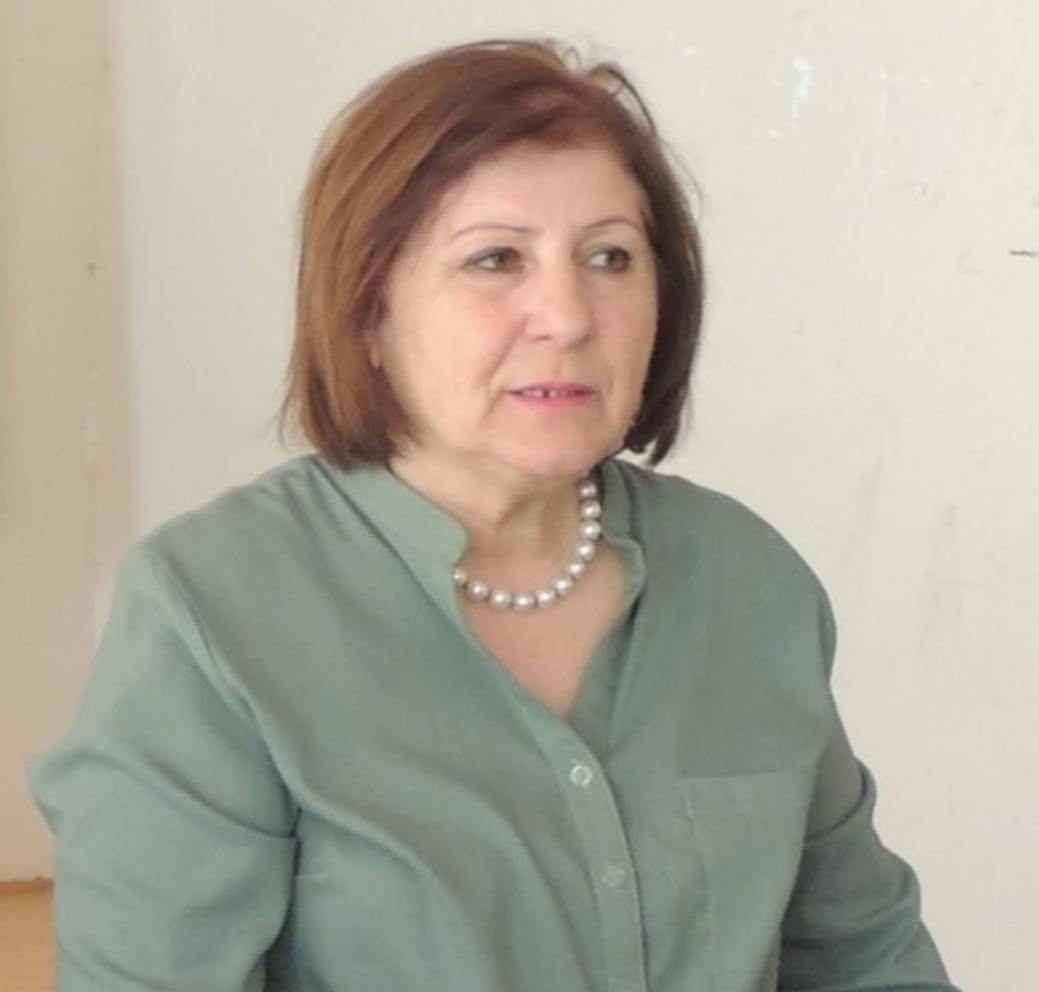
Combatting domestic violence against women: going beyond a one-time help
43% of women in Azerbaijan were subjected to domestic violence, says the 2018 report of the NGO “Human Rights Defenders”. The highest number of cases of domestic violence or crimes resulting from gender-based violence were reported in six regions of the country – Shaki, Zaqatala, Guba, Mingachevir, Ganja and Shamkir. The “Solidarity Among Women” Public Union wants to change this, offering, thanks to a subgrant provided by the EU-funded project “Protecting human rights of vulnerable groups in Azerbaijan” implemented by the OHCHR, a solution which goes beyond a one-time help. Equipping women with the knowledge on what are gender equality, domestic violence or legal mechanisms for protection can make the necessary shift and help them advocate for own rights. And this is where NGOs, local authorities and the media play a crucial role.
“I always like to quote the famous saying: ‘Give a man a fish, and you feed him for a day. Teach a man to fish, and you feed him for a lifetime’. Our approach to training and capacity building is just like that”. Ruhangiz Huseynova is the Chairwoman of the “Solidarity Among Women” Public Union, an NGO founded in 2002 to increase women’s role in decision-making and to enhance their awareness (particularly in the rural areas of Azerbaijan) on the national legislation and policies governing gender issues and women’s affairs. “Up to date we have delivered over 1,000 training programmes all over Azerbaijan”, – says Ruhangiz.
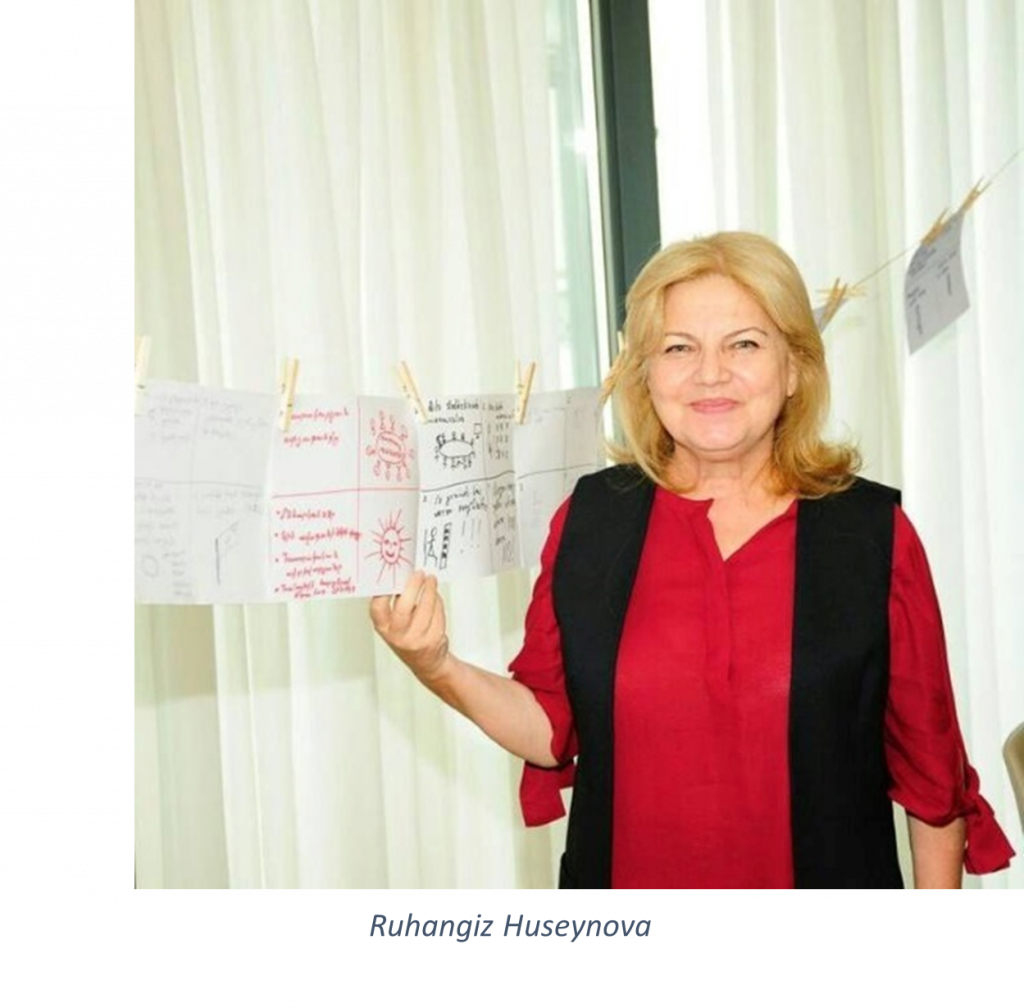
Drawing on reports and own observations in the field of domestic violence, the organisation decided to tackle the six most affected regions of the country using the support from the United Nations Office of the High Commissioner for Human Rights. Financed by the EU, it came as a perfect tool to raise public awareness on the issue of domestic violence against women, to improve the professional knowledge and skills of public authorities working in this field, as well as to promote the role of media in preventing gender abuse.
“I’ve learned many things I didn’t know before or used to spend a lot of time to search for”
Six awareness-raising workshops – one in each identified region – targeted almost 120 local NGO activists, community activists, teachers, psychologists as key actors in the prevention of domestic violence on the ground. The workshops gave insights on the current state of domestic violence in the world and in Azerbaijan, the international and national legislation, the key features and types of domestic violence, its consequences and protection mechanisms.
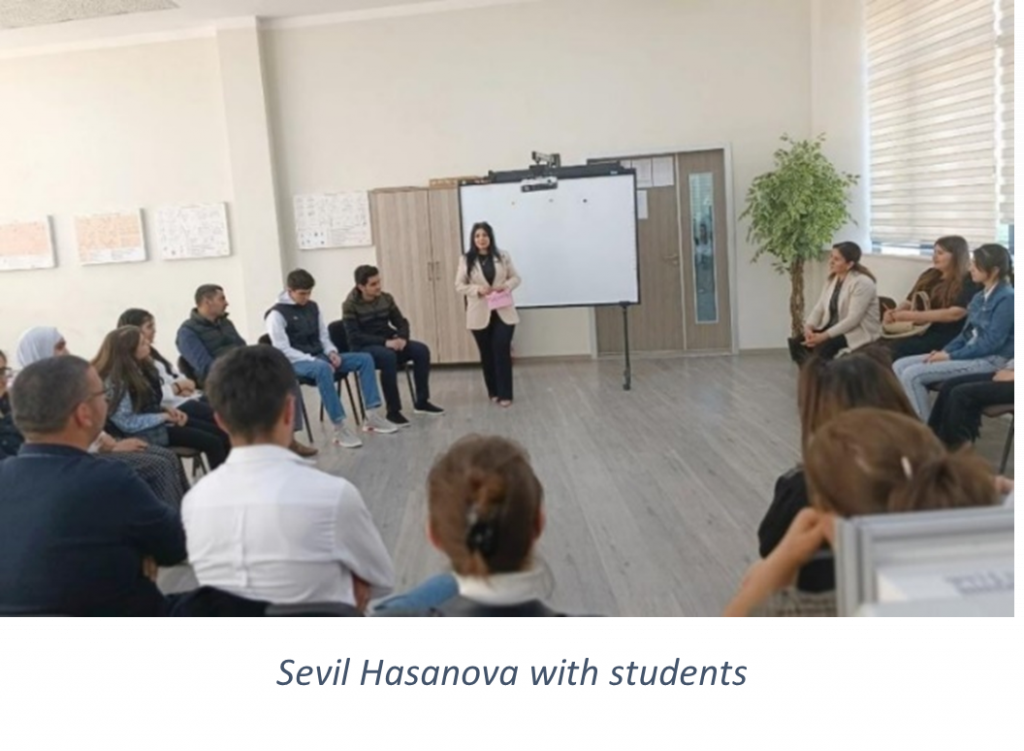
Sevil Hasanova, a community activist and a teacher-psychologist, took part in the session in Mingachevir in January 2023. “For years I have been conducting trainings among community groups – but primarily among students of vocational education institutions in Mingachevir and Barda – on gender equality, domestic violence, trauma-related abuse, bullying, suicide, that’s why the topic was very relevant to my field of practice as a psychologist and an educator. I wanted to know more about the root and the cause of violence, and understand the ways to address this problem”, – explains the woman.
Sevil has been promoting the concept of non-violence among her students, and the topics of the training were valuable for her academic workplan. She uses the new information to better analyse and understand each individual student’s emotional background, family history or past trauma if relevant. “Some girls are in conflict with their mothers who restrict their freedom. Others have problems with their abusive fathers… I use my practice and the training materials to understand whether the abuse in my students’ family comes from a psychological trauma or it is a consequence of a family member’s neurological disorder – this puts me in the position to help them. I am going to apply the new techniques in the classroom, along with my own resources, to teach how to stay away from violent behaviours”, – concludes Sevil.
“The training helped me to improve my professionalism”
Whereas the regional workshops for NGOs and community activists were mostly informative, the six training sessions held in January and February 2023 in the same six target regions were practical and skill-based. They were developed for government officials, in particular, for the representatives of the Monitoring Groups on Domestic Violence operating in the target regions, including representatives of regional departments of healthcare, regional justice offices, prosecutor’s offices, police, as well as municipalities. “It was absolutely necessary to work with the government because local executive authorities, as the umbrella organisation guiding the work of the Domestic Violence Monitoring Groups in each rayon, have a legal mandate to investigate and address the reported cases of domestic violence, liaising with responsible institutions like police, courts, government agencies. They provide direct support to the victims of abuse, usually women and children, through own resources and mechanisms”, – remarks Ruhangiz Huseynova.
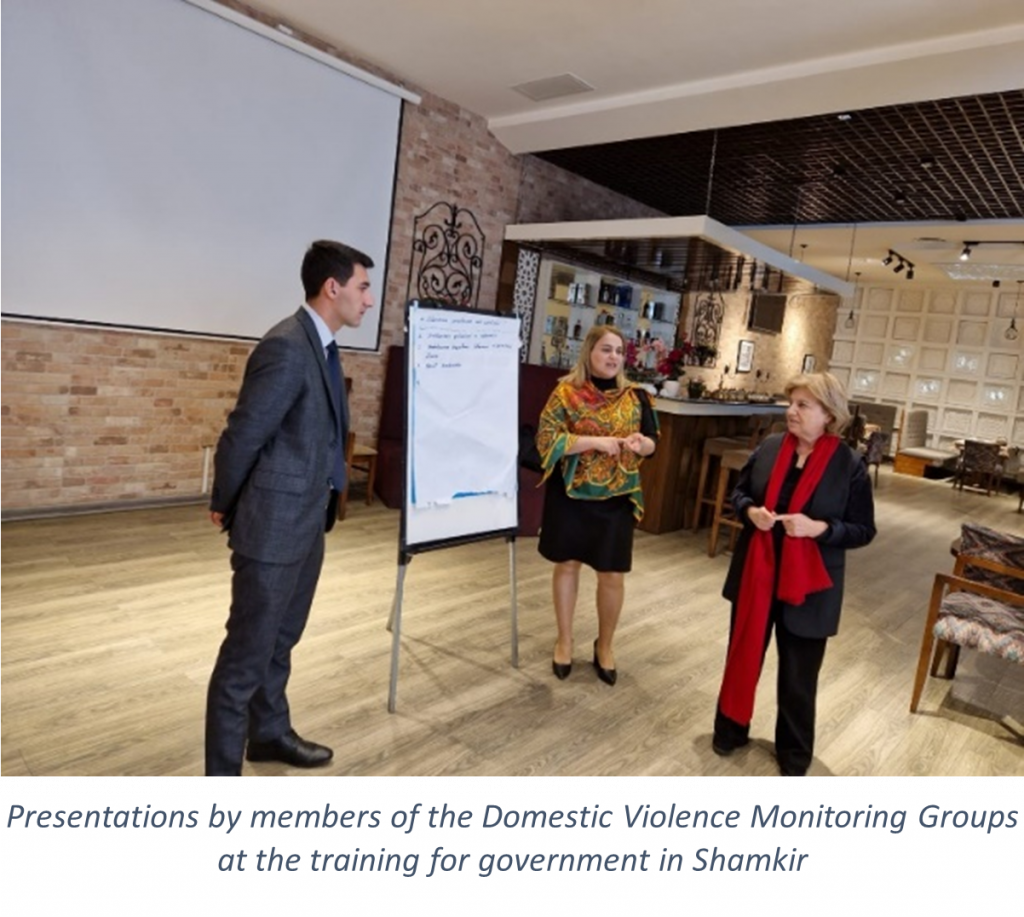
How to demonstrate empathy to the victim of gender abuse? Which ethical considerations should be taken into account? Through group work, tests and role plays demonstrating best behavioural models, the participants uplevelled their professional skills when addressing violations of gender equality. Rufana Alieva, a training participant, is the Head of the Municipality Gender Commission in Ganja City Kapaz Municipality. “The Commission is relatively new, initiated only 2-3 years ago. We receive individual complaints from citizens on various matters, most of them are civil cases where women and families are affected. We provide financial assistance, initiate petitions to government institutions, police, courts, etc. The training helped me to analyse these cases in a more in-depth manner. I had also a chance to connect to my counterparts from other municipalities and to understand how similar cases have been addressed in different regions”, – says Rufana.
“I could be a bridge in our collective battle against domestic violence”
The focus of the project on the media was not random. They are considered a powerful force in shaping public perception on domestic violence. Explaining why journalists got in the spotlight, the Head of the “Solidarity Among Women” Public Union remarks: “It bothered me that journalists often reported about domestic violence cases in such a way that – intentionally or unintentionally – their articles sometimes justified the abuse at home or portrayed women who were victims of domestic violence as if they were the root of the problem, as if they were the ones to blame and not the perpetrators!”.
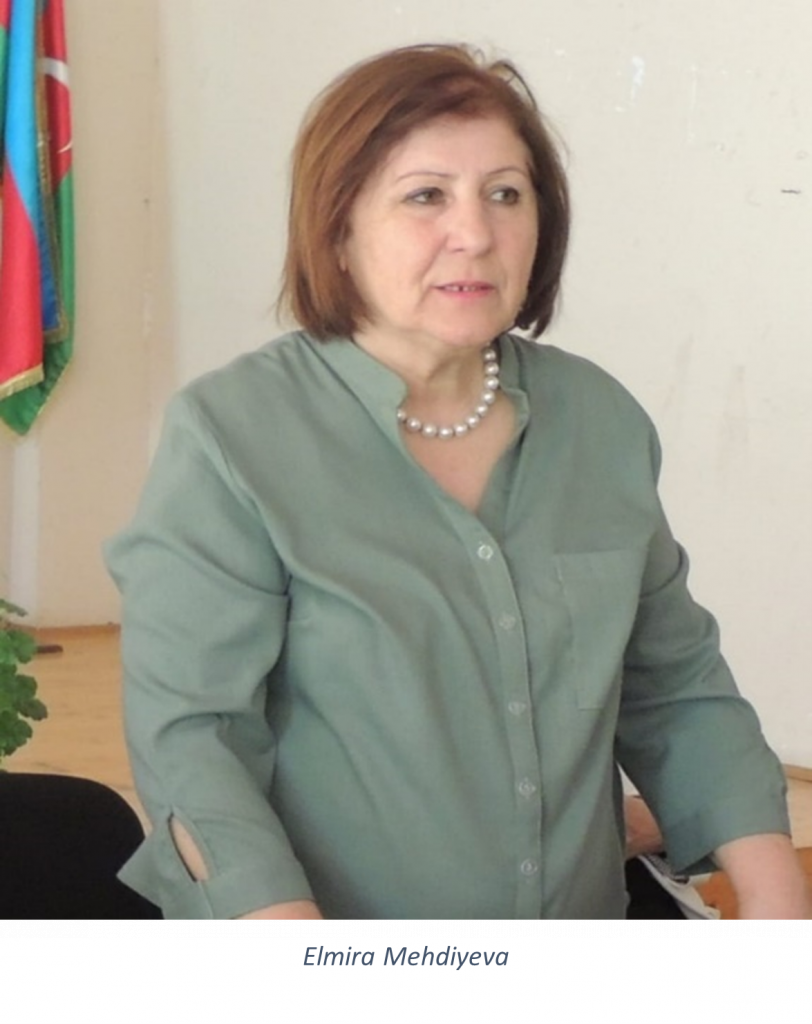
The training for media representatives that took place in Baku in April 2023 was an insightful experience for its participants. Along with the basic concepts and the legal framework on gender-based violence, the training stressed the role and responsibility of journalists in media coverage of domestic violence cases, outlined ethical principles during media coverage, as well as reminded the requirements for professional conduct.“I am always in contact with vulnerable communities, I work with women, young girls. I often try to help, reach out to the families or groups close to the families of women who are faced with abuse”, – says Elmira Mehdiyeva, a journalist and Head of the “Yeni Fikir” Journalist Solidarity Public Union. – “People in our community know me and listen to my advice. This motivated me a lot to join the training. The information I learned at the event was useful for my project which focuses on support to war veterans: it helped to better meet the needs of female family members of war veterans and understand the effects of the trauma they had gone through in their family relationships”.
Is it possible to see the desirable change?
Brick by brick, Ruhangiz and her team have been building awareness on the issue of domestic violence across the country – through targeted events, a dedicated Game portal, a booklet “End domestic violence against women”, an article competition and a guide for journalists – reaching out to thousands and thousands of people. And the signs of a positive change are becoming visible. “Of course, behavioural changes and changes in a public mindset, particularly with respect to women’s rights and gender equality, are hard to achieve instantly”, – agrees the NGO Chairwoman, Ruhangiz Huseynova.
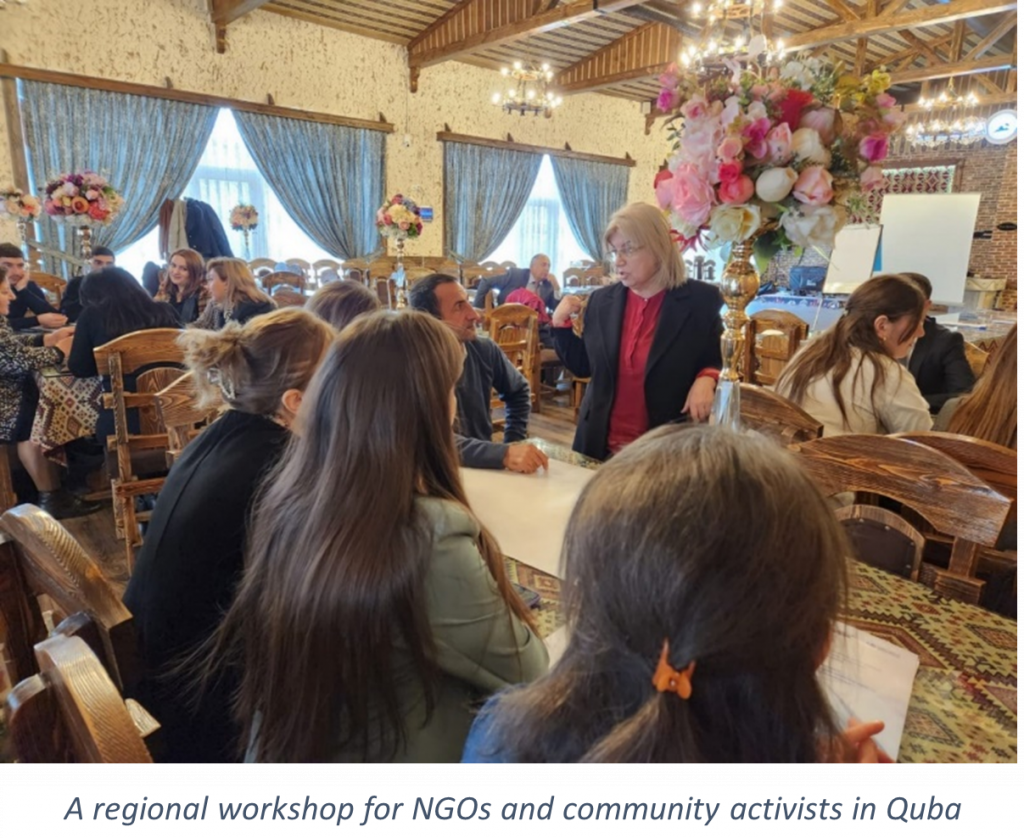
“However, there were people among participants, surprisingly even women from rural parts of the country who at the start of our workshops were very confrontational. For example, there was a woman from Zaqatala who claimed that her region had a very progressive and liberally thinking population in terms of gender equality. Once it was true, indeed. However, we had official statistics at hand which proved the opposite. By the end of each workshop, those participants who used to be sceptical and confrontational about the existence of domestic violence in their regions or in our society overall, came to admit that, indeed, what they thought to be family norms and traditions was in fact gender inequality and sometimes even gender-based violence – whether economic, psychological or physical one. I’m glad that in this sense, our work has made a tangible contribution to fostering the culture of opening-up about gender-based violence”.